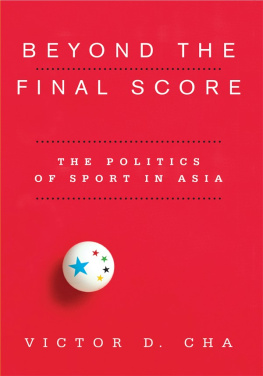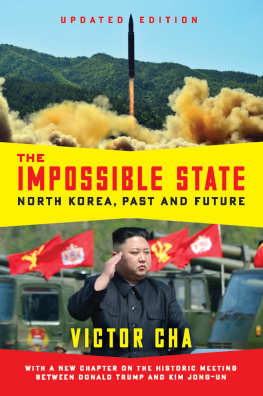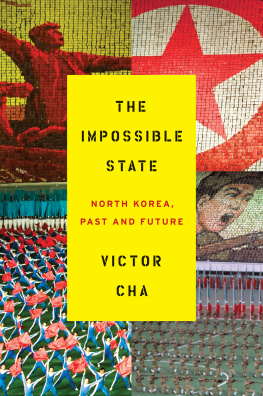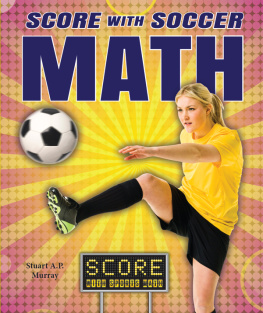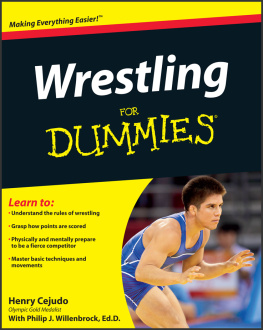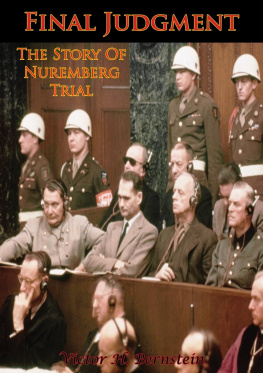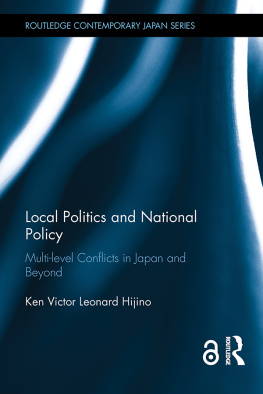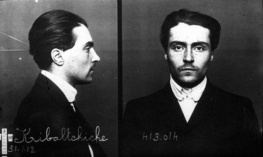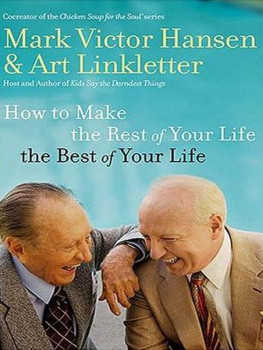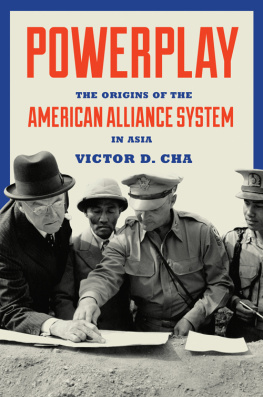BEYOND THE FINAL SCORE
CONTEMPORARY ASIA IN THE WORLD
CONTEMPORARY ASIA IN THE WORLD
David C. Kang and Victor D. Cha, Editors
This series aims to address a gap in the public-policy and scholarly discussion of Asia. It seeks to promote books and studies that are on the cutting edge of their respective disciplines or in the promotion of multidisciplinary or interdisciplinary research but that are also accessible to a wider readership. The editors seek to showcase the best scholarly and public-policy arguments on Asia from any field, including politics, history, economics, and cultural studies.
BEYOND THE FINAL SCORE
THE POLITICS OF SPORT
IN ASIA
VICTOR D. CHA
COLUMBIA UNIVERSITY PRESS NEW YORK
Columbia University Press
Publishers Since 1893
New York Chichester, West Sussex
cup.columbia.edu
Copyright 2009 Columbia University Press
All rights reserved
E-ISBN 978-0-231-51929-8
A Caravan book. For more information, visit www.caravanbooks.org.
Library of Congress Cataloging-in-Publication Data
Cha, Victor D., 1961
Beyond the final score : the politics of sport in Asia / Victor D. Cha
p. cm.(Contemporary asia in the world)
Includes bibliographical references and index.
ISBN 978-0-231-15490-1 (cloth : alk. paper)ISBN 978-0-231-15491-8 (pbk. : alk. paper)ISBN 978-0-231-51929-8 (e-book)
1. SportsAsiaHistory. 2. SportsPolitical aspectsAsia. 3. OlympicsPolitical aspectsAsia. 4. Olympic Games (29th : 2008 : Beijing, China)
I. Title. II. Series.
GV649.C43 2009
796.095dc22
2008023579
A Columbia University Press E-book.
CUP would be pleased to hear about your reading experience with this e-book at .
References to Internet Web sites (URLs) were accurate at the time of writing. Neither the author nor Columbia University Press is responsible for URLs that may have expired or changed since the manuscript was prepared.
To the memory of my father, Moon Young Cha
19342005
An eternal Columbian (GS 59, MBA 61)
CONTENTS
FIGURES
Closing Ceremonies, Athens, 2004
Anti-Soviet Bumper Sticker at the 1984 Olympic Games
Murder in Munich: Time Cover, September 18, 1972
Summer Olympic Games Venues, 18962012
Winter Olympic Games Venues, 19242014
International Olympic Committee Membership by Continent (Percentage)
South Korean Toilet-Shaped House
US Ping Pong Players at Great Wall, Time Cover, April 26, 1971
President Nixon and Mao Tse-Tung Shaking Hands
Yoyogi National Stadium
The Birds Nest: Beijing National Stadium Under Construction
The Water Cube: Beijing Olympic National Aquatics Center
Beijing 2008 Olympic Torch Relay
Beijing 2008 Olympic Torch Relay in London
Beijing 2008 Olympic Torch Relay in London
Beijing 2008 Olympic Torch Relay in Paris
Paralympic Torchbearer Jin Jing Shielding the Olympic Torch
TABLES
Olympic Medal Counts, 18962004 Summer Olympics
Olympic Medal Counts, 19242006 Winter Olympics
International Olympic Committee Membership by Continent and Percentage of Total Membership
Summer Olympics Medal Tally for China, Japan, the Koreas, Australia, 18962004
Winter Olympics Medal Tally for China, Japan, and the Koreas, 19242006
T his is a book that I have wanted to write for the past ten years or so. It was one of those projects where one keeps a folder as one comes across different articles, citations, and stories with the intention one day to write it all up.
The inspiration for the book came from a trip I took to Indonesia and Australia as part of the delegation of a former Stanford colleague, Secretary of State Condoleezza Rice. Over one of the informal dinners with the traveling press corps, the conversation turned to sport, and she completely floored me with her encyclopedic knowledge of professional sports (particularly the Cleveland Browns). If someone this important knew that much about sport, I thought, then it has to matter in politics in some fashion.
So when I left the White House in May 2007 after serving since 2004 on the National Security Council as a director of Asian affairs, I believed this would be the perfect time to take up the task. It would also be a good way to deal with policy withdrawalthat is, when the adrenalin rush of fifteen-to-sixteen hour days and seven-day weeks at the NSC is replaced by the sinking feeling that you no longer know tomorrows news today.
I began reading up on the topic from the day after I left the White House compound and planned a course, Cultural Diplomacy in Asia, for the fall 2007 semester at Georgetown, around the readings. In part, time pressures were severe because I left government about eight months later than I had originally planned and also because I wanted to get the book out around the time of the Beijing Olympics.
I am indebted to many people and institutions for their help in bringing this project to completion. My students in the Cultural Diplomacy class were wonderful sounding boards for the readings and for their different observations and stories. Portions of the project were presented at the Institute for International and Strategic Studies in London, the School for Oriental and African Studies, Harvard Universitys Asia Center, Stanford University, the Center for Strategic and International Studies, and Georgetown Universitys Mortara Center for International Studies.
My longtime friend and colleague Dave Kang at Dartmouth has heard me talk of this project over the years and read chapters, offering his usual good advice and critical comments in his California-style good humor. Bob Jervis read earlier chapters, and his encouragement and opinions continue to matter to me more today than any other international relations scholar I know of. I continue to benefit from advice and discussions with Mike Green, my colleague in government and now at Georgetown, who understands the theory-policy nexus in Asia better than most. I am grateful to Dana Allin, Bob Gallucci, Fred Hiatt, Chris Hill, Jim Kelly, Abraham Kim, Christine Kim, Kate McNamara, Derek Mitchell, Andy Nathan, Tae-Gyun Park, Gary Quinlan, Leslie Vinjamuri, Erik Voeten, Ezra Vogel, Dennis Wilder, and two anonymous reviewers for their comments on the project.
Anne Routon is my editor at Columbia, and she is, quite simply, an authors dream. She kept me focused on the topic and on the timeline and encouraged me to write in a manner that was still scholarly but with resonance for a larger readership. Because of unexpected demands on my time for personal reasons, Anne took on an even larger role in shepherding the manuscript for which I am extremely grateful. Michael Haskell cleared his desk of many important projects in order to supervise both the manuscript and production editing for the book. The application of his skills to this work has made it infinitely better substantively and a much easier read.
My departure from government was not well timed in terms of the grant-giving calendar. Thus, I received no foundation support or research grants for this book. I worked with one part-time undergraduate research assistant, Taylor Fincher, who did a fantastic job in all aspects, from collecting press clippings to creating charts to doing outreach for interviews. He deserves much credit for the work.
My beloved wife, Hyun Jung, or Honey, has been so very supportive of all of my work. My mother, Soon Ock Leem, and brother, Michael, have always been there for me with love and understanding. I dearly miss my father, Moon Young Cha, to whom this book is dedicated. This work would have benefited greatly from many interesting conversations with him, and without them, it is not nearly as good a piece of work.


